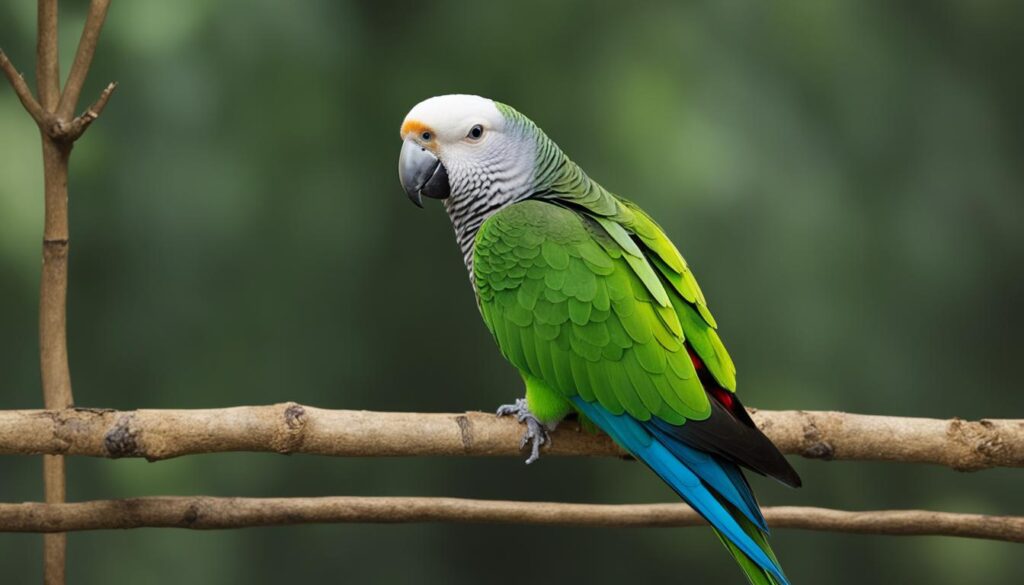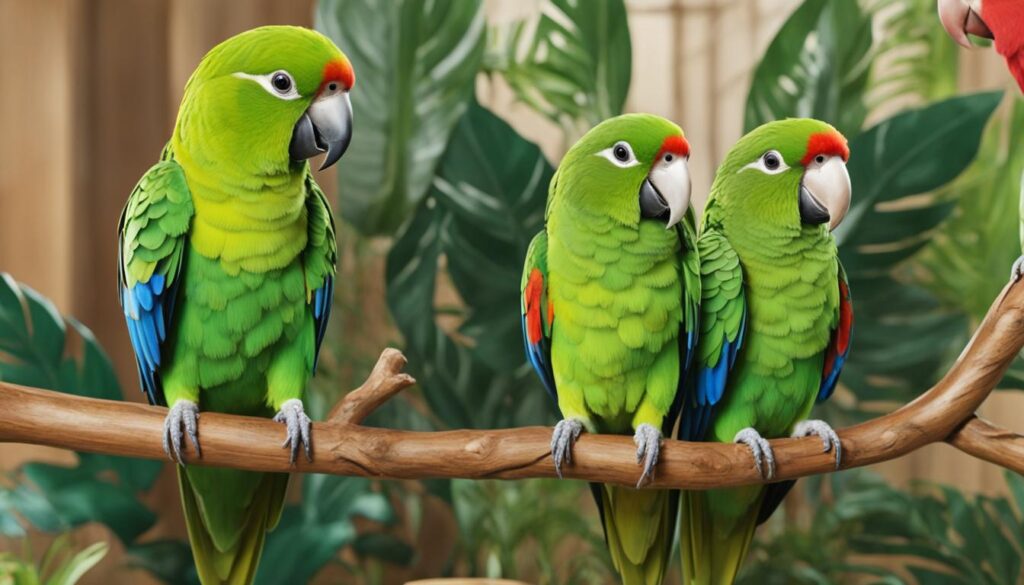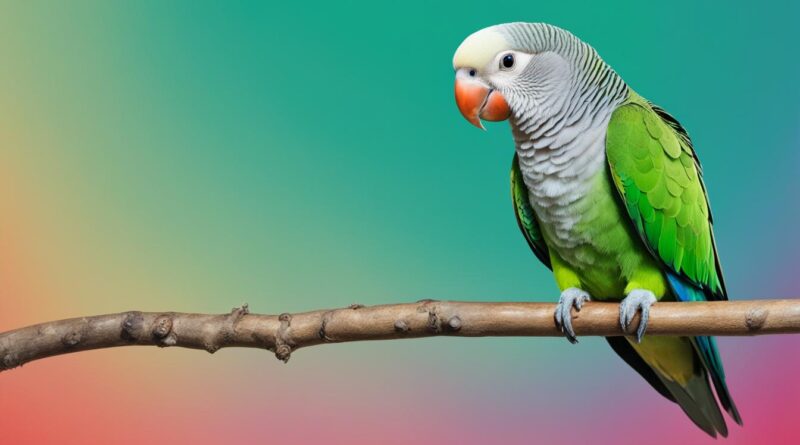Quaker Parrot Lifespan: Expectancy Details
Welcome to our guide on the lifespan of Quaker Parrots! If you’re a proud owner or considering becoming one, understanding the average lifespan of quaker parrots is crucial. Quaker Parrots, also known as Monk Parakeets, have a potential lifespan of 20 to 30 years or even longer with proper care.
The lifespan of a Quaker Parrot can vary depending on several factors such as its environment, diet, and health care. Captive birds that receive proper attention, care, a varied diet, and a suitable habitat are more likely to live longer. In comparison, Quaker Parrots in the wild face threats like predators and extreme weather events, which can impact their lifespan.
It’s essential for Quaker Parrot owners to understand these factors to ensure their birds live a long and healthy life. In this article, we’ll explore the various factors that influence the lifespan of Quaker Parrots and provide you with valuable insights to help you nurture your feathered companion.
Key Takeaways:
- Quaker Parrots have an average lifespan of 20 to 30 years or even longer with proper care.
- Their lifespan can be influenced by factors such as environment, diet, and health care.
- Captive Quaker Parrots that receive proper attention, care, and a suitable habitat tend to live longer.
- Wild Quaker Parrots face threats like predators and extreme weather events that can impact their lifespan.
- Understanding these factors and providing the necessary care can contribute to your Quaker Parrot’s longevity.
Understanding Quaker Parrot Lifespan Variability
The lifespan of Quaker Parrots can vary depending on several factors. One crucial factor is the environment in which they live. Wild Quaker Parrots face threats like extreme weather conditions and predators, which can shorten their lifespan. On the other hand, captive Quaker Parrots that are provided with a safe and stimulating environment can live longer.
The Impact of Environment on Lifespan
Quaker Parrots in the wild are exposed to various hazards that can affect their lifespan. Extreme weather conditions, such as heatwaves or severe cold, can be detrimental to their health and survival. They may also encounter predators that pose a threat to their safety. These challenges can significantly reduce the lifespan of wild Quaker Parrots.
In contrast, captive Quaker Parrots have the advantage of living in a controlled environment. Providing a safe and stimulating habitat for your pet Quaker Parrot can contribute to their overall well-being and increase their lifespan. A spacious cage with appropriate perches, toys, and enrichment activities can keep them mentally and physically stimulated, promoting a longer and healthier life.
Diet and Health Care: Keys to Longevity
In addition to their environment, the diet and health care of Quaker Parrots play a vital role in determining their lifespan. A well-balanced and nutritious diet is essential for their overall health and longevity. Quaker Parrots should be provided with a variety of foods, including high-quality parrot pellets, fresh fruits, vegetables, nuts, and seeds. Adequate hydration is crucial, so make sure to provide fresh water daily.
Regular veterinary care is also important to ensure the well-being of your Quaker Parrot. Schedule regular check-ups with an avian veterinarian who can monitor their health and detect any potential issues early on. Vaccinations, parasite control, and dental care are essential components of their overall health care routine.
Remember, providing a suitable environment, a nutritious diet, and regular veterinary care are key factors in increasing the lifespan of your Quaker Parrot. By taking these measures, you can enjoy the companionship of your feathered friend for many joyful years to come.
How Long Does a Quaker Parrot Live in the Wild vs Captivity?
Reliable data on the lifespan of Quaker Parrots in the wild is limited. However, studies indicate that wild Quaker Parrots have a maximum lifespan of around 15 years. In comparison, captive Quaker Parrots can live for 20 to 30 years or even longer with proper care. The difference in lifespan between wild and captive Quaker Parrots highlights the impact of the environment and the care they receive.

| Lifespan in the Wild | Lifespan in Captivity | |
|---|---|---|
| Average Lifespan | Around 15 years | 20 to 30 years or longer |
| Factors Affecting Lifespan | Threats like predators and extreme weather events | Proper care, safe environment, and nutrition |
The lifespan of a Quaker Parrot can significantly differ depending on its living conditions. While wild parrots face various threats and challenges, captive parrots who receive adequate care and attention can enjoy a longer and healthier life.
Providing a safe and comfortable environment, along with a balanced diet and regular veterinary care, are essential factors in extending the lifespan of captive Quaker Parrots. These birds thrive when they are given the right conditions to flourish, showcasing the potential for them to live well beyond their wild counterparts.
Nurturing Your Quaker Parrot: Factors Influencing Longevity
To ensure the longevity of your Quaker Parrot, it’s important to consider various factors that can influence their lifespan. Creating a safe habitat, ensuring a balanced diet, and providing timely veterinary care are key aspects of nurturing your feathered friend.
Creating a Safe Habitat
One of the fundamental factors in promoting a long and healthy life for your Quaker Parrot is creating a safe habitat. It’s essential to provide a clean and spacious cage that offers room for exercise and exploration. Avoid placing the cage in direct sunlight or drafty areas to prevent temperature extremes. Additionally, remove any potential hazards, such as toxic plants, wires, or small objects that your parrot may ingest.
Importance of a Balanced Diet
A balanced diet is crucial for the overall health and longevity of your Quaker Parrot. Offer a varied and nutritious diet that includes commercial parrot foods, fresh fruits, vegetables, nuts, and seeds. This diversity provides essential vitamins, minerals, and nutrients to support their immune system and prevent deficiencies. Avoid feeding your Quaker Parrot foods that are toxic or harmful to their health, such as chocolate, avocado, apple seeds, or onions.
Timely Veterinary Care for Preventive Health
Regular veterinary care plays a vital role in ensuring the well-being and longevity of your Quaker Parrot. Schedule routine check-ups with an avian veterinarian to monitor their health and identify any potential issues early on. Follow your vet’s recommendations for vaccinations, parasite prevention, and necessary treatments. Promptly addressing any health concerns or changes in behavior can help prevent serious complications and extend your Quaker Parrot’s lifespan.

| Factors Influencing Quaker Parrot Lifespan | Description |
|---|---|
| Safe Habitat | Providing a clean and spacious cage, free from hazards |
| Balanced Diet | Offering a combination of commercial parrot foods, fresh fruits, vegetables, nuts, and seeds |
| Timely Veterinary Care | Scheduling regular check-ups and prompt treatment of health issues |
By considering these factors and providing a nurturing environment for your Quaker Parrot, you can contribute to their long and healthy life. Remember, each bird is unique, and it’s essential to observe their behavior and consult with a veterinarian for personalized care and guidance.
Common Health Concerns Affecting Quaker Parrots
Quaker Parrots, like any other living beings, can experience health concerns and diseases. It’s important for Quaker Parrot owners to be aware of these common health issues to ensure the well-being and longevity of their feathered companions.
Some of the health concerns that may affect Quaker Parrots include:
- Fatty Liver Disease: Quaker Parrots can develop a condition called fatty liver disease if they consume a diet high in fat. This can lead to liver impairment and other associated health problems.
- Self-Mutilation: Quaker Parrots may engage in self-mutilation behavior, which involves excessive feather plucking or chewing their own skin. This can be a sign of underlying health issues or stress.
- Feather-Plucking Behavior: Feather-plucking is a common issue in Quaker Parrots and can have various causes, including boredom, stress, health problems, or lack of mental stimulation.
- Stress-Related Illnesses: Quaker Parrots are sensitive creatures and can develop stress-related illnesses if they are exposed to constant stressors, such as loud noises, sudden changes in their environment, or lack of social interaction.
- Sensitivities to Certain Human Foods: Quaker Parrots can have sensitivities to certain human foods, including chocolate, avocado, apple seeds, and onions. These foods can be toxic to them and should be avoided.
Recognizing and addressing these health concerns promptly is essential to prevent serious complications and ensure the overall health and longevity of your beloved Quaker Parrot.
Conclusion
Quaker Parrots have a potential lifespan of 20 to 30 years or even longer with proper care. Creating a safe habitat, providing a balanced diet, regular veterinary care, and addressing health concerns promptly are key to ensuring their longevity.
By offering a clean and spacious cage, free from hazards, you can provide a safe environment for your Quaker Parrot to thrive. A balanced diet that includes a variety of nutritious foods such as commercial parrot foods, fresh fruits, vegetables, nuts, and seeds will meet their nutritional needs.
Regular veterinary care, including preventive health check-ups and prompt treatment of any health issues, is vital in extending your Quaker Parrot’s lifespan. Recognizing and addressing common health concerns like fatty liver disease, self-mutilation, feather-plucking behavior, stress-related illnesses, and sensitivities to certain human foods will help ensure their overall well-being.
With love and proper care, your Quaker Parrot can be your feathered companion for many years to come. By considering their specific needs and providing the necessary care, you can enjoy the joy and companionship of your Quaker Parrot for their entire lifespan.
FAQ
How long does a Quaker Parrot live?
Quaker Parrots have a potential lifespan of 20 to 30 years or even longer with proper care.
What factors influence the lifespan of Quaker Parrots?
The environment, diet, and health care play a significant role in determining the lifespan of Quaker Parrots.
How does the environment impact the lifespan of Quaker Parrots?
Wild Quaker Parrots face threats like extreme weather conditions and predators, while captive Quaker Parrots that are provided with a safe and stimulating environment can live longer.
What is the importance of diet and health care for the lifespan of Quaker Parrots?
A balanced diet and regular veterinary care contribute to the longevity of Quaker Parrots.
How long do Quaker Parrots live in the wild compared to captivity?
Wild Quaker Parrots have a maximum lifespan of around 15 years, while captive Quaker Parrots can live for 20 to 30 years or more.
What factors can help extend the lifespan of Quaker Parrots?
Creating a safe habitat, providing a balanced diet, and ensuring timely veterinary care are crucial in extending the lifespan of Quaker Parrots.
What are common health concerns affecting Quaker Parrots?
Common health issues that may affect Quaker Parrots include fatty liver disease, self-mutilation, feather-plucking behavior, stress-related illnesses, and sensitivities to certain human foods.
How can I ensure the longevity of my Quaker Parrot?
By providing a safe habitat, a balanced diet, regular veterinary care, and addressing specific health needs, you can ensure that your Quaker Parrot lives a long and healthy life.


